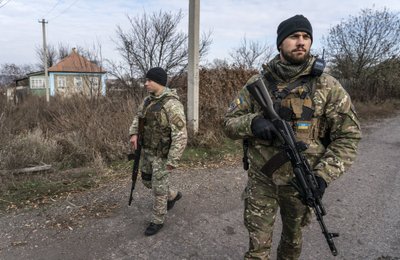One famous Frenchman once made the discovery: opposites attract. More than two centuries later another famous Frenchman took it too literally and said – Russia is indeed a European country. Every other statement by Emmanuel Macron confirms the dangerous tendency which starts to emerge for us – the new geopolitical axis of Lisbon-Vladivostok. An idea that obviously neglects Eastern European countries’ interests (just like Nord Stream-2 does). Macron’s German counterpart, Angela Merkel, is an old school experienced politician and tries not to make loud statements in public. However, in practice, Germany is doing everything in order for German companies to finally receive Russian gas. Under the rustle of Russian money the deprecations from it’s main NATO ally overseas – the United States – are not even heard or considered. To export European values is quite profitable nowadays. The Western European democracies prefer their politics to be guided by pragmatic calculation.
What is left to us, the countries in the east of Europe, in this situation? We are left with a stigmatized fear of the Russian threats aggravated by the traumatic experience of Soviet power. The leaders of Germany and France are stubbornly ignoring statements about “tanks to Warsaw in a day” just like they do not notice military exercises on the border with the Baltic countries. Not even mentioning they prefer to forget about Russian troops in Donbas and Ukrainian Crimea. Six years ago, Ukraine also could not believe that the existential fear of Russian imperialism would become real. Putin dreams of rebuilding the empire and this is by no means just our “suspicion”, Mr. Macron.
How effective will NATO be in the event of direct or hybrid Russian aggression against Lithuania, for example? Will European countries have courage for the direct declaration of war? The lack of coordination on, for instance, Turkey’s recent actions in Syria generally makes one think whether NATO as an organization is effective enough in responding promptly to the challenges that are definitely ahead. The countries of Eastern Europe should recognize that in the existing geopolitical system we are the border of Europe. The frontier does not leave space for undertones. If we want to survive as subjects of international politics – we must be strong.
In order to change the situation for our favor we need to start rethinking the security strategy in the following directions:
integration in the Baltic-Black Sea direction;
enhancing our own defense capabilities through an alliance with the United States.
The Baltic-Black Sea Alliance was already nominally formed in June this year during a notorious vote to return the Russian delegation to the PACE. These are Ukraine, Poland, Lithuania, Latvia, Estonia and Georgia that should become the first members of the union and the main initiators of Baltic-Black Sea integration and in the future they should work to attract Belarus as well.
The idea behind such association has a long history. Some countries have a historical experience of coexistence inside the borders of the Rzeczpospolita (Polish-Lithuanian Commonwealth) that used to be a threat to Russia’s imperial policy for a long time. Therefore the following countries have an experience of creating a military-political alliance as well. For the first time the Baltic-Black Sea Union emerged almost a hundred years ago during the conferences of 1919 – 1920s. The idea was supported in Poland, Ukraine, Estonia, Latvia, Lithuania, Belarus and Finland. The Baltic-Black Sea geopolitical concept and prospects for union were developed by Ukrainian thinkers Stepan Rudnytsky, Mykhailo Hrushevsky, Polish politicians Józef Piłsudski, Lech Wałęsa, Lithuanian politicians Algirdas Brazauskas and Casimir Prunskene, Latvian Minister Siegfried Meyerowitz, Estonian Minister Kaarel Robert Pusta, Georgian politicians Noi Jordania and Eugene Gegechkori. The issue was raised at summits in the 1990s in Ukraine and Lithuania and received a fresh impetus in the speeches of Polish President Andrzej Duda. Even the leader of Belarus, Alexander Lukashenko, at times when the pendulum of his policies ranged away from Moscow, repeated the rhetoric of his opposition Zeno Poznyak about the importance of Baltic-Black Sea integration.

The idea of the Baltic-Black Sea Union is once again arising under conditions of the strong need for supranational EU and NATO projects to be transformed. The globalist strategy of integrating Brussels as single common center does not work. French President Emmanuel Macron sees an exit in the restarting pan-European project which stands on three pillars – freedom, protection and progress. However, he does not see his “Europe to Vladivostok” policy denying a key pillar – protection – for countries that are Russia’s immediate neighbors.
In the European Union the voice of Eastern Europe is also not very audible. Poland’s endeavor to take the place of an independent significant player is met with criticism from Western Europe. In his recent statement Macron actually set Poland an ultimatum: in a growing conflict between the US and Europe, Poland must abandon Polish-American security initiatives. Paradoxically, in this respect, European politicians appear even more conservative than those whom they so often accuse in conservatism.

Western European leaders can actually be understood. They live in their own understanding of the world, completely different problems are in their focus. With the destruction of the old security and economic system they prefer to maintain the status quo even if they will be supported by Russia in this trial. Value dissonance and the contradiction between declarations and real action have far more dangerous consequences than it might seem: if one takes away the value component from the European Union, then this union will become the Coal and Steel Community of the 1950s.
In this case, it should be understood that the Baltic-Black Sea integration in the future gives our countries control over the strategic corridor between the two seas and the exits to these seas correspondingly. With Georgia, access to the Caucasus and Middle East region is also being added. It is even more than coal and steel. With the fierce fight for Nord Stream-2 and the Ukrainian gas transportation system as well as China’s initiative to restore “the Silk Road” (One Belt One Road project) it is an invaluable advantage.
If Western Europe is no longer ready to offer new guidance, the Baltic-Black Sea corridor must become not only a territory that generate shared economic benefits, but also the territory of new senses. The Baltic-Black Sea Alliance is creating new challenges and at the same time it is an opportunity to respond to them. This is indeed the true idea of “Europeanism”. Europe is a search for something new. We have a mission to give new answers to what Europe can be today.
However, the Baltic-Black Sea union can only be effective if the second condition is fulfilled: the increase of military power of each of these states. Establishing a military alliance with the United States may be an effective tool for implementing the strategy.

It is worth mentioning that the US is already increasing its’ bilateral support for Eastern European NATO members, in particular, Poland, Lithuania and Romania. Georgian-American relations are also traditionally good. For Ukraine, instead, the key goal should be to obtain Major Non-NATO Ally status.
Actually, with the new geopolitical situation the Baltic-Black Sea Alliance can only count on the US support. For Americans, it is important to have a new player who can balance a possible alliance of Western European countries and Russia’s strengthening through it. Regardless of Trump’s pro-Russianism, the United States will always remain Russia’s leading contradictory. Just like we will. As practice shows, the US assistance to its’ allies is usually fast, real, and “kills enemies”.
So here is why we need Baltic-Black Sea integration if to sum up:
the military alliance of Poland, Ukraine, Lithuania, Latvia, Estonia, Georgia (and Belarus in the long run) with the support of the US will be a more effective alternative to deter Russian aggression than a valid security policy that operates to the interests of Western countries;
In terms of politics, the Baltic-Black Sea Alliance will form a coalition of countries that share common principles and interests and will be able to provide new answers to what Europe is now;
control over the Baltic-Black Sea corridor at the intersection between important world routes and access to both seas can be transformed into significant economic benefits.
To escape the paradigm of confrontation between the West and the East is vital for Eastern European countries as well as to recall the existence of equally important geopolitical direction: North-South. We should re-identify our own way of development through strengthening our military capabilities and the Baltic-Black Sea integration.
The Baltic-Black Sea Alliance in one form or another is strategically the only possible answer for our countries to meet the challenges of a new age and new geopolitical situation. We need to start working on the practical implementation of the Baltic-Black Sea Strategy.
One famous German said – what does not kill us makes us stronger. It’s time to be strong! Join now!

